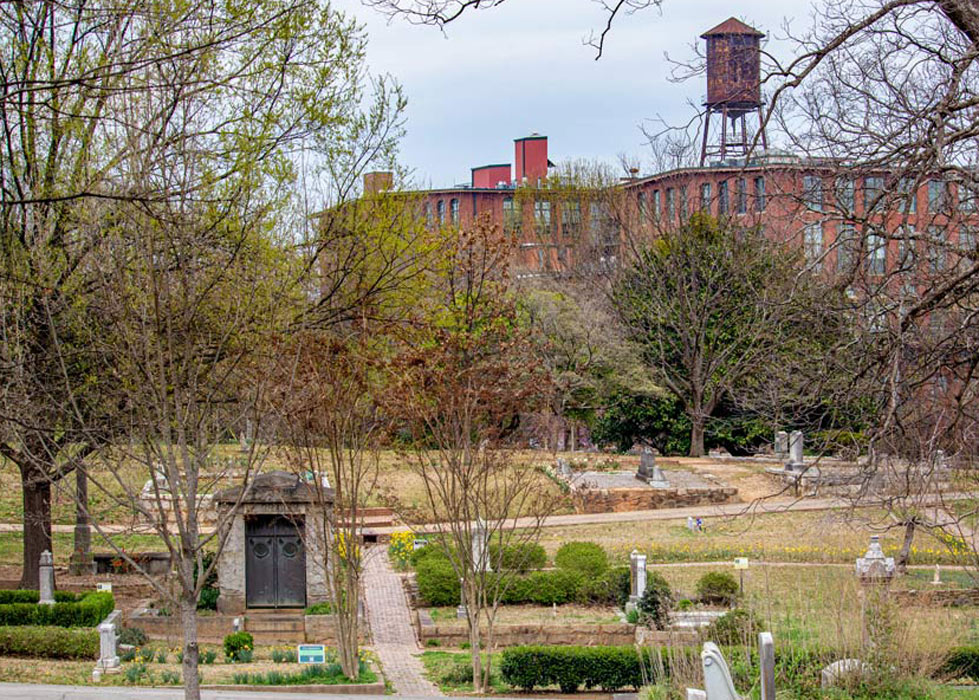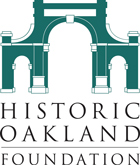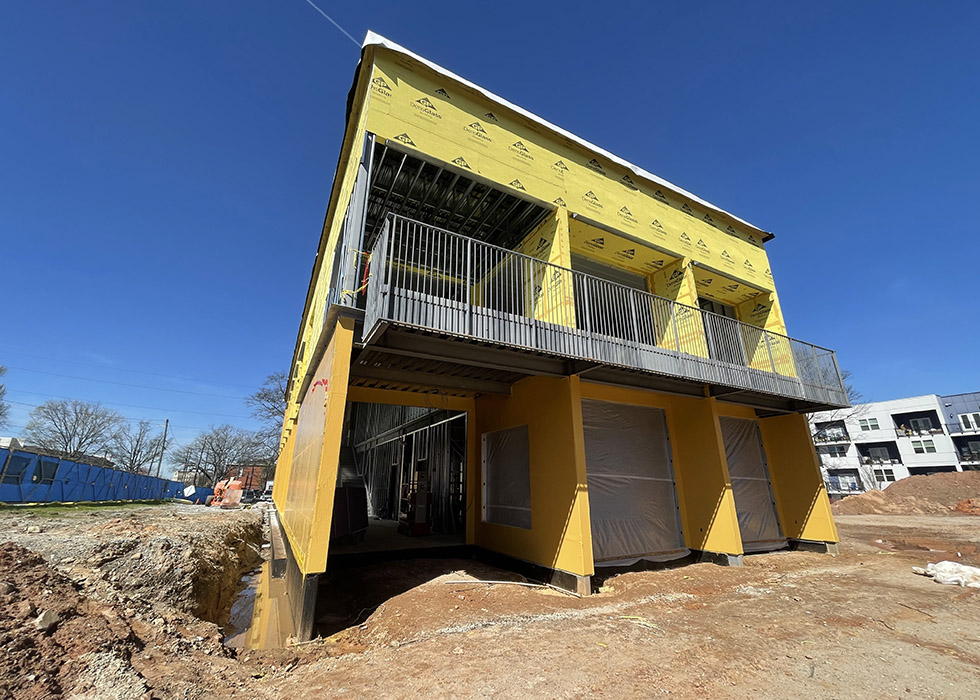
An Update on our Racial Equity Commitments
The past year has demanded individual, organizational, and national reflections on, and renewed commitments to, racial equity. Historic Oakland Foundation (HOF) has not been an exception. On June 2, 2020, we issued the following statement:
Oakland Cemetery is the final resting place of more than 70,000 Atlantans. The enslaved and their enslavers, the oppressed and their oppressors, the empowered and those who sought to take that power away – all rest beneath the gravestones and gardens of Oakland. Historic Oakland Foundation is committed to truth-telling and sharing the whole history of Atlanta, especially the injustices faced by many of its citizens.
We stand in solidarity with all Black people in the fight against racial injustice and inequality. As a historic site, we have the responsibility to recognize and challenge historic oppression. As a city park, we strive to make Oakland more inclusive, accessible, and sustainable for everyone. As members of the Atlanta community, we will listen to and support our fellow Atlantans as we all fight for real and lasting change.
We have been working internally and externally to grow as an organization, to intentionally center diversity, equity, inclusion, and accessibility in every part of our work, and to enact and embody the commitments we have made publicly. This is the first of a series of updates on our endeavors. We emphasize that the work of making public history and our organization more equitable is an ongoing process that will never be finished.
Public-Facing Work
Representation in Programming: Many of you engage mainly with HOF through our public programming (tours, programs, special events, digital content, and Visitors Center). Continuing work that began with the introduction of a cell-phone tour in our historic African American burial grounds in 2011, the interpretive update of our Sights, Symbols, and Stories overview tour in 2016, and the expansion of African American stories in our Capturing the Spirit of Oakland Halloween tours starting in 2008, HOF’s programming team has expanded representation communities that have been marginalized both historically and often contemporarily —especially Oakland’s Black residents. We have begun to address historical erasure and silences in historical records and how they have informed the traditional narrative of Atlanta.
In 2020, COVID-19 forced us to cancel our annual arts festival, Illumine, which was to be centered in Oakland’s historic African American burial grounds. We look forward to featuring this area and its amazing stories when we are able to host Illumine again in 2022. And, while our larger 2020 Juneteenth partnership with Flux Projects and curator Charmaine Minnefield was significantly smaller than we had been planning for, we are excited to continue working with them to provide meaningful programming this year and next. We also continue to elevate African American stories in our award-winning Capturing the Spirit of Oakland Halloween tours and are excited about other projects we are working on to highlight the rich, diverse history of Oakland. This year, we debuted a documentary film about Oakland resident Bishop John Wesley Gaines and the founding of Morris Brown College. The documentary, To God and Truth: The Life and Legacy of Bishop Wesley John Gaines, was produced in conjunction with Morris Brown as they seek reaccreditation.
There are many stories left to be told about Oakland, both about those who have been laid to rest here and about those who worked on its grounds.
Interpretive Plan
We are writing an organizational interpretive plan which will ensure that diversity, equity, inclusion, and access are part of the lens that shapes all of our interpretive work at Oakland. With a guiding document that informs the ways in which we discuss hidden histories, train tour guides, and share Oakland with the public, we will be able to make our progress longer-lasting and more sustainable.
Confederate Monuments
Georgia law currently prohibits the removal of Confederate monuments, though individual municipalities have circumvented this law by accepting the fines imposed on them by the state as part of the removal cost. As Oakland is a city park, HOF must defer to the City of Atlanta on matters concerning its Confederate monuments—the Confederate Obelisk and the Lion of Atlanta. The city oversees all upkeep of these monuments, carries out remediation if the monuments are vandalized, and is ultimately responsible for whether or not they are removed.
While HOF has no direct control over Oakland’s Confederate monuments, we do have a responsibility to interpret these monuments for what they are, how they have been used, and what they represent today. We began the year recommitting to working with our city councilors, the Department of Parks and Recreation, and the Office of Cultural Affairs to contextualize Oakland’s Confederate monuments by challenging ahistorical narratives about the Civil War and fostering community conversations about the contemporary meanings of both Confederate monuments and Civil War history in Atlanta and at Oakland. For more information on the conflict surrounding Confederate monuments and the vandalism that has taken place on-site, please read our FAQ.
Community Partnerships
We’re proud of the work we have done over the years to build deep relationships with a diverse range of community partners across our beloved city. We’re taking stock of how we can be the best possible partner in both our internally and externally facing work. Community partnerships should not merely allow one organization to expand audiences or check diversity boxes. They should be reciprocal, and we are committed to sharing HOF’s resources towards cultivating a more equitable cultural and historical community.
Supporting Black-Owned Businesses
HOF’s work in promoting diversity, equity, inclusion, and access extends to the vendors, contractors, and businesses we support with our purchasing power and platform. We are looking for new opportunities to support businesses owned by Black people, Indigenous people, and other people of color (BIPOC). This includes the vendors who provide merchandise for our Visitors Center, the food trucks we feature at our special events, the artists we employ to design our marketing collateral, and the sub-contractors we hire to do work on the grounds.
Expanding Access
Though we have made some progress, we need to further increase access to Oakland Cemetery and to our programming. In 2020 we opened a new East Gate at the corner of Memorial Drive and Boulevard to expand physical access for our neighbors to the east. The COVID-19 pandemic challenged us to expand our digital programming, as well. Our Capturing the Spirit of Oakland Halloween tour film, for example, expands HOF’s geographical reach and makes the annual event accessible to those who are physically unable to traverse the cemetery grounds. Though we rely on earned income from programming to fund our work, we are also exploring how to minimize economic barriers to engaging with Oakland by increasing our free programs. We look forward to relaunching golf cart tours, and other tour accommodations for visitors with a diversity of needs when we can resume in-person activities.
Preservation & Landscaping Work
The work we do on our grounds helps preserve the stories of the historical landscape of Oakland and informs our educational programming, tours, and special events. In recent years, HOF has made progress in restoring historically neglected areas of the cemetery, beginning with the preservation and restoration of Oakland’s historic Jewish areas, the restoration of the 1908 Women’s Comfort Station, and the completion of the hardscape restoration of Oakland’s historic African American burial grounds. In 2020, we began restoring the landscape of the historic African American burial grounds and look forward to completing this important work in 2021. As we prepare to rehabilitate Oakland’s 1899 Bell Tower building in 2021, we are ensuring that this beautiful, historic building will be as accessible to all visitors as possible when the work is complete.
Internally Facing Work
In summer 2019, we began working with an external consultant to conduct an organizational audit of our practices, policies, and procedures and understand opportunities for growth and improvement. Then, in August 2020, we conducted three educational sessions (the first of many) for all of our staff and regular contractors to establish a shared understanding of diversity, equity, access, inclusion, the dismantling of white supremacy, the acknowledgment of implicit bias, and antiracism. From these sessions and the conversations they provoked, came a reaffirmation of our collective and individual commitments to making HOF a more inclusive, accessible, equitable, and diverse organization with a culture that celebrates these guiding principles. Some short-term activities and solutions emerged that have already begun to shape our work. Here are a few highlights:
Staff Performance Reviews and Goals
Diversity, equity, inclusion, and access goals were included in our 2020 mid-year and 2021 annual goals and performance reviews for all staff.
Staff Recruitment
In a city that is more than 62% BIPOC, 30% of HOF staff (six out of 20) identify as BIPOC. We are writing a hiring policy that will help address our dissatisfaction with this statistic. We will continue to post salary information for each open position, ensure that all job postings actively encourage a diverse pool of applicants, ensure that our interviewing and hiring practices are informed by best practices in the field, and ensure that we are creating and maintaining a cultural environment that embraces current and future staff members.
Organizational Culture
We are intentionally re-focusing our attention on our organization’s core values (inclusion, integrity, innovation, inspiration) in 2021 and have asked every staff member in our weekly staff meetings to report on how they are living these values each week.
Internships
In addition to beginning to pay all of our interns, we are actively building sustainable relationships with new partners to expand intern diversity. We are proud of the relationships that we have developed with institutes of higher education in this city like our neighbors at Georgia State University, and we commit ourselves to building new connections with Atlanta’s Historically Black Colleges and Universities in order to provide rewarding internship opportunities for a racially and ethnically diverse group of interns.
Volunteer Recruitment and Training
Three percent of our core group of volunteers identify as BIPOC. In fall 2020, we worked with a group of students from Emory’s Business School who provided pro-bono consulting services to help identify new strategies for recruiting a diverse group of volunteers and for making our volunteer culture more inclusive. We are in the process of activating these strategies. Moreover, we are designing new training opportunities for our volunteer tour guides, visitor center volunteers, and all HOF volunteers to ensure that all of our volunteers have the tools and skills necessary to support our organizational goals.
Board Recruitment
One member of our board of trustees (out of 21) identifies as BIPOC. With the executive and board governance and nominating committees of our board of trustees, we cultivating a racially, ethnically, professionally, and age-diverse next class to join our board of trustees. We have paused nominating new board members until 2022 to ensure that we build intentional relationships with potential board candidates.
Historic Oakland Foundation is fundamentally an organization grounded in, and responsive to, our communities. This year we will identify ways to listen to and work more with all of our members, visitors, and neighbors, and we look forward to sharing those with you, especially when we are able to meet-in-person again.
We embrace the opportunities before us. We will continue to listen and learn and to work towards making HOF a more inclusive, accessible, diverse, equitable, and anti-racist organization. We invite you to help inform our work moving forward by submitting your feedback and ideas using the form below.
Continued best wishes from all of us at Historic Oakland Foundation,

Richard Harker
Executive Director
Leave a comment



